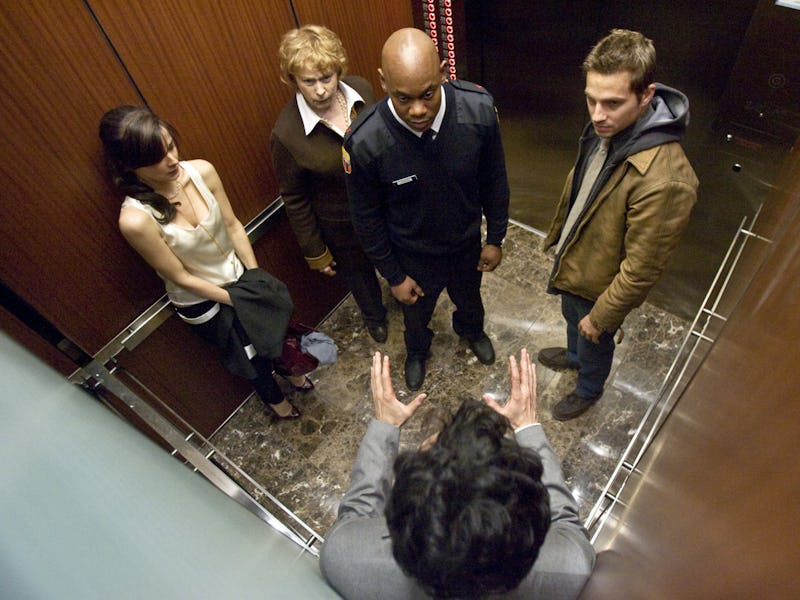M. Night Shyamalan’s Most Underrated Movie Put A Macabre Spin On The Locked Room Thriller
All aboard the hellevator.

You know that split-second stomach lurch when your elevator abruptly halts between floors? As the moments tick by with no signs of movement, even the calmest people will find their palms getting sweaty. Will you have to jab the emergency button? Yell for help? What if it’s futile? And if you’re crammed in with other people, then good luck —your anxiety levels are now tied to how frantic they get.
M. Night Shyamalan reworked this terror into a story meant to be the first part of his proposed Night Chronicles trilogy, a horror series based on his ideas but helmed by other directors. Fifteen years later, Devil remains the only instalment. 30 Days Of Night (2007) co-writer Brian Nelson fleshed out the story into a screenplay, while John Erick Dowdle was hired to direct, having impressed Shyamalan with his 2007 serial murderer mockumentary The Poughkeepsie Tapes. The result is a brisk 80-minute thriller in which five strangers are trapped inside a skyscraper elevator, paranoia mounts, suspicion turns to bloodshed, and they begin dying.
With Shyamalan saying he’d been inspired by Agatha Christie’s mystery novels, reviews immediately honed in on the film’s similarities to And Then There Were None. In Christie’s book, 10 strangers on an isolated island start getting knocked off, and soon realize the murderer is one of them. Shyamalan, however, lets us in on a fresh twist upfront — a voiceover reveals that one of these strangers is the devil himself, hellbent on tormenting his fellow passengers before snatching their souls.
Those trapped are newly hired security guard Ben (Bokeem Woodbine), who has a history of assault, Ponzi scheme architect Vince (Geoffrey Arend), gold-digger Sarah (Bojana Novakovic), thief Jane (Jenny O’Hara), and former marine Tony (Logan Marshall-Green), whose crime is revealed as a late, shattering twist. Each appears cruel and conniving, which means their inevitable demises should be satisfying, but Devil’s mix of taut suspense and unnerving gore renders them upsetting. There are extended blackouts as the power intermittently fails, during which the sounds of scuffling, slamming, smashing, and screams leave viewers in the dark. The passengers can hear the security team over an intercom, but faulty equipment means they can’t be heard back. Devil plays with the fallibility of human perception, and how easy it is to only see what we want to.
Cinematographer Tak Fujimoto innovates within the tight elevator space. Take a scene in which he drops us into Vince’s POV as his eyes rove over Sarah’s body. Fujimoto later angles the frame so that we can’t see what really happens a second before she accuses him of groping her; only surveillance footage eventually reveals the truth. Within the elevator, the camera moves shakily, conveying the dizziness its suffocating atmosphere can induce. The choice of minimalist setting is used to maximum effect — there are aggravations from not only fellow passengers, but the irritatingly chipper elevator music. The mirror’s glass shards and hanging cable become makeshift weapons, and every new threat is amplified by the confined space. Consider the pepper spray Jane pulls out; aimed at one, it would blind them all.
Finally, a movie that advocates for taking the stairs.
While lore-heavy voiceovers about the devil’s unchanging approach are often grating — an unintentionally hilarious scene features a security guard insisting Satan is the reason his toast has fallen jelly-side down — the film zips along when it leans into its mystery elements. Detective Bowden (Chris Messina) shrugs off supernatural explanations in favour of digging into each captive stranger’s past, locating compelling motives some might have to slaughter the others. Each new revelation is a juicy turn, and as the tension inside the elevator mounts, so does the urgency of the agonizingly slow rescue efforts.
When the Devil trailer played at San Diego Comic Con months after the release of Shyamalan’s infamous flop The Last Airbender, audiences booed at the sight of his name. Despite having handed over the creative reins for Devil, Shyamalan’s stamp is all over it, and it marks a fine return to form. Like Signs (2002), another of Shyamalan’s religiously-tinted movies, Devil also features an intoxicated driver and a hit-and-run that leads to a seemingly insurmountable loss of not just a man’s family, but his faith. The wounded characters of both films, however, find their way back. For all its genre thrills, Devil is also about forgiveness, and its final notes are a welcome contrast to all the horror that’s come before.